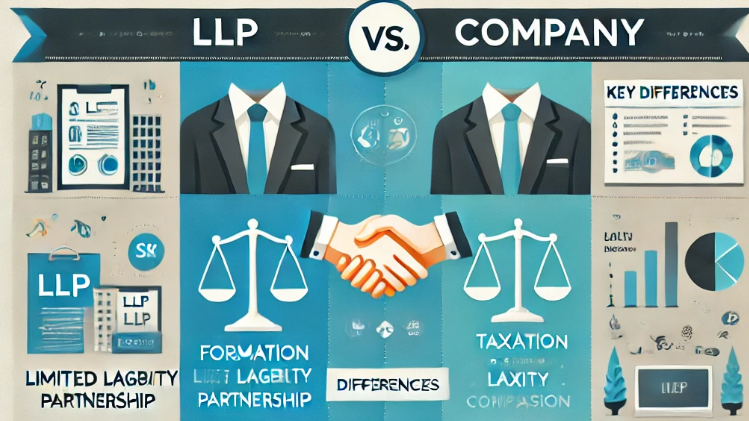Private Limited Company or LLP? Which is the best in India?
Choosing between a Private Limited Company (Pvt Ltd) and a Limited Liability Partnership (LLP) in India depends on your business objectives, scale, and compliance preferences. Below is a comparison of the two structures to help determine which is best for your business:
1. Legal Identity
-
Private Limited Company:
- A separate legal entity governed by the Companies Act, 2013.
- Recognized as a corporate structure with higher credibility.
-
LLP:
- A separate legal entity governed by the LLP Act, 2008.
- Combines the benefits of a partnership with limited liability.
Best for: Pvt Ltd companies are preferred if you aim for higher recognition and credibility in corporate environments.
2. Ownership and Management
-
Private Limited Company:
- Requires a minimum of 2 directors and 2 shareholders (can be the same individuals).
- Ownership is determined by shareholding, making it easier to transfer shares or attract investors.
-
LLP:
- Requires a minimum of 2 partners, with at least one designated partner being a resident of India.
- Ownership is based on the partnership agreement and is less flexible for transfers.
Best for: Pvt Ltd companies are ideal for businesses looking to scale with external funding and investors.
3. Compliance Requirements
-
Private Limited Company:
- Higher compliance, including mandatory annual filings with the Registrar of Companies (RoC).
- Must conduct annual general meetings, maintain statutory registers, and file financial statements.
-
LLP:
- Lower compliance compared to Pvt Ltd companies.
- Requires annual filing of Form 8 (Statement of Accounts and Solvency) and Form 11 (Annual Return).
Best for: LLPs suit small and medium enterprises (SMEs) with limited compliance capacity.
4. Funding and Investment
-
Private Limited Company:
- Easier to raise funds through equity shares, venture capital, or angel investors.
- Eligible for Foreign Direct Investment (FDI) under the automatic route.
-
LLP:
- Limited avenues for raising funds; cannot issue shares.
- FDI is permitted but subject to certain restrictions.
Best for: Pvt Ltd companies are better for businesses with plans to attract significant funding or external investors.
5. Taxation
-
Private Limited Company:
- Corporate tax rate: 25% (for turnover up to ₹400 crore) or 30% (above ₹400 crore).
- Dividend Distribution Tax (DDT) was abolished in 2020, but dividends are taxed in the hands of shareholders.
-
LLP:
- Taxed at a flat rate of 30% on income.
- Exempt from dividend tax and Minimum Alternate Tax (MAT), making it more tax-efficient.
Best for: LLPs are more tax-efficient for smaller businesses without complex profit distribution.
6. Ease of Setup
-
Private Limited Company:
- Registration is slightly complex, with higher costs and documentation (e.g., MOA, AOA).
- Requires Digital Signature Certificates (DSCs) and Director Identification Numbers (DINs).
-
LLP:
- Easier and less expensive to set up.
- Requires LLP Agreement and fewer compliance documents.
Best for: LLPs are easier to establish for small businesses and startups with limited capital.
7. Scalability and Credibility
-
Private Limited Company:
- Suitable for businesses planning to scale or expand rapidly.
- Better suited for IPOs, acquisitions, and formal funding rounds.
-
LLP:
- Suitable for businesses with steady growth and no immediate expansion plans.
- Limited scalability due to funding restrictions.
Best for: Pvt Ltd companies are preferred for businesses with ambitious growth plans.
8. Conversion
- An LLP can be converted into a Pvt Ltd company, but the reverse process is more complex.
- Choose LLP for flexibility, and Pvt Ltd for long-term scalability.
Which is Best?
-
Choose Pvt Ltd Company if:
- You plan to scale the business significantly.
- External funding is a priority.
- You need high corporate credibility.
-
Choose LLP if:
- You want lower compliance and operational costs.
- Your business will remain small to medium-sized.
- Tax efficiency and ease of management are priorities.
Prepared by:
Naufal Nazar
Auditor & Secretarial
Picco Advisory


